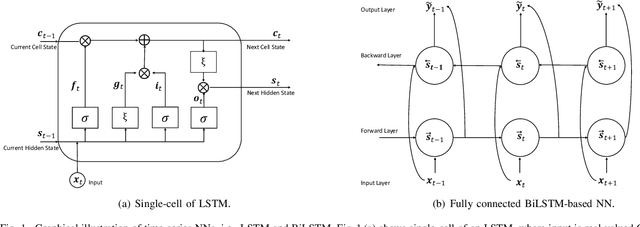Real-Time Massive MIMO Channel Prediction: A Combination of Deep Learning and NeuralProphet
Paper and Code
Aug 11, 2022



Channel state information (CSI) is of pivotal importance as it enables wireless systems to adapt transmission parameters more accurately, thus improving the system's overall performance. However, it becomes challenging to acquire accurate CSI in a highly dynamic environment, mainly due to multi-path fading. Inaccurate CSI can deteriorate the performance, particularly of a massive multiple-input multiple-output (mMIMO) system. This paper adapts machine learning (ML) for CSI prediction. Specifically, we exploit time-series models of deep learning (DL) such as recurrent neural network (RNN) and Bidirectional long-short term memory (BiLSTM). Further, we use NeuralProphet (NP), a recently introduced time-series model, composed of statistical components, e.g., auto-regression (AR) and Fourier terms, for CSI prediction. Inspired by statistical models, we also develop a novel hybrid framework comprising RNN and NP to achieve better prediction accuracy. The proposed channel predictors (CPs) performance is evaluated on a real-time dataset recorded at the Nokia Bell-Labs campus in Stuttgart, Germany. Numerical results show that DL brings performance gain when used with statistical models and showcases robustness.
 Add to Chrome
Add to Chrome Add to Firefox
Add to Firefox Add to Edge
Add to Edge